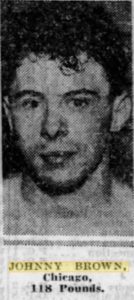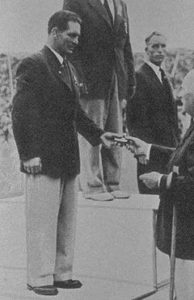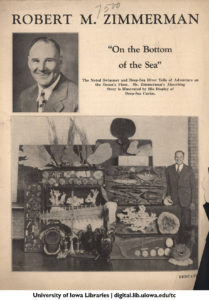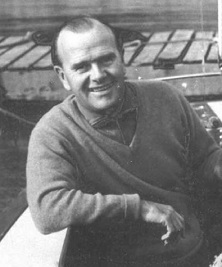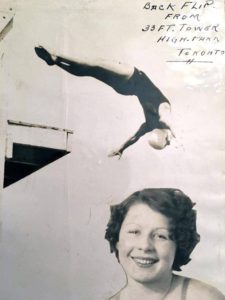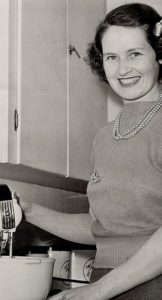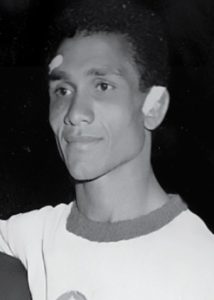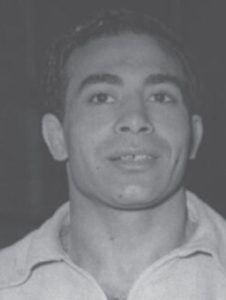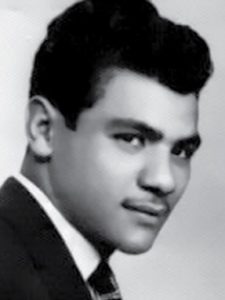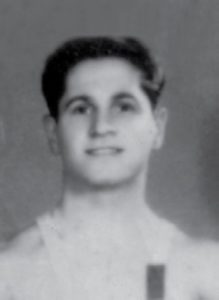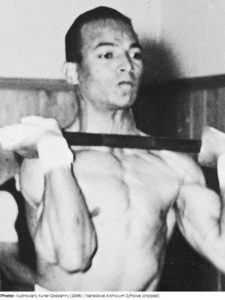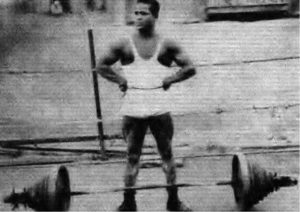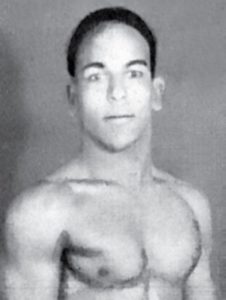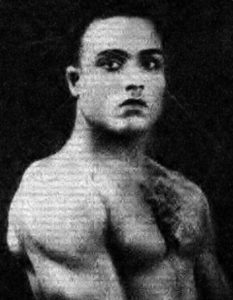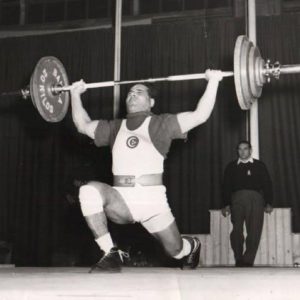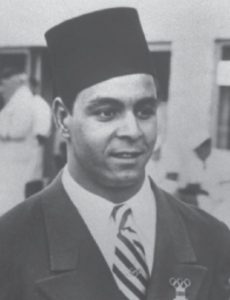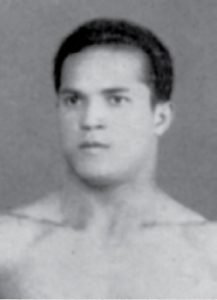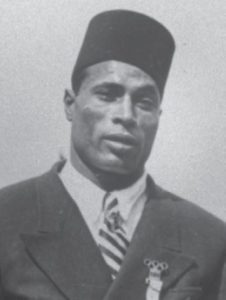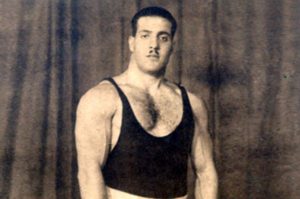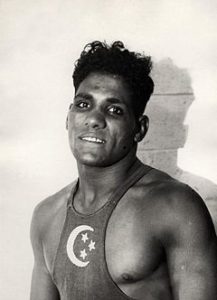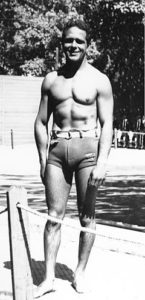Last month we noted the 104th birthday of American kayaker John Lysak, born August 16, 1914, who is, to the best of our knowledge, the oldest living Olympian. As we have mentioned in the past, however, there are approximately 2500 Olympians born between 1908 and 1928 for whom we have no confirmation on whether they are alive or deceased, not counting the 564 Olympians who participated in the Games in 1928, 1932, and 1936 for whom we have no information on their date, or even year, of birth. Today we want to focus on a small subset of those 2500, the 231 Olympians who would be older than John Lysak if they were still alive. We have already covered the two medalists who fall into this category, Ibrahim Orabi and Adolf Müller, and 16 more are either non-starters or demonstration event competitors, so to shorten the list just a little, we are going to look at the remaining 213 by year of birth.
It should be noted that discussing these individuals in no way represents any belief on the part of Oldest Olympians that these athletes are still alive; we simply cannot confirm that they are deceased. In fact, we find it highly unlikely that any Olympian who is between the age of 104 and 109 would have somehow escaped our attention completely. It remains, however, an important caveat and is always a possibility: language barriers, poor media coverage of older athletes, and desire for privacy from a generation when the Games were not as big as they are now all contribute to the chance that someone may have eluded our radar. In the past, several Olympic centenarians have reached that milestone with little public fanfare, sometimes not being revealed until their death. We therefore feel that it is important to share this list to make our research methods a little more public and subject to scrutiny, and perhaps solve a case or two along the way.
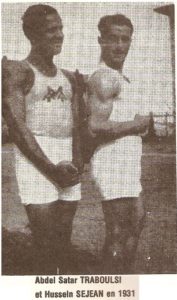
On the left, Abdel Sattar Tarabulsi, who represented Lebanon in sport shooting at the 1952 Summer Olympics. Photograph from: https://www.abdogedeon.com/volleyball/NOUJOUM/abdelsattar%20traboulsi.html
1908
[table]
Name,Nation,Sport,Birthday
Sayed Mohammad Ayub,Afghanistan,Field hockey,November 20 1908
Cecil Bissett,Zimbabwe,Boxing,1908
Abdel Sattar Tarabulsi,Lebanon,Sport shooting,1908
Elfriede Zimmermann,Germany,Swimming,1908
[/table]

Syed Muhammad Salim, who represented Pakistan in field hockey at the 1948 Summer Olympics
1909
[table]
Name,Nation,Sport,Birthday
Abdullah Jaroudi Sr.,Lebanon,Sport shooting, 1909
Ahmed Ibrahim Kamel,Egypt,Diving,1909
Khalil Ibrahim,Egypt,Diving,1909
Yuki Mawatari,Japan,Swimming,1909
Tetsutaro Namae,Japan,Diving,1909
Syed Muhammad Salim,Pakistan,Hockey,September 5 1909
Rokuro Takahashi,Japan,Rowing,1909
[/table]
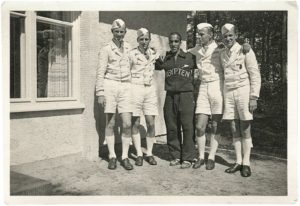
Rashad Shafshak, who was a member of Egypt’s 1936 Olympic basketball team
1910
[table]
Name,Nation,Sport,Birthday
Henrique Camargo,Brazil,Rowing,October 28 1910
Paul Cerutti,Monaco,Sport shooting,November 30 1910
Alberto Conrad,Bolivia,Swimming,March 26 1910
Hoo Kam Chiu,Hong Kong,Sport shooting,May 7 1910
Rafael Lang,Argentina,Boxing,September 5 1910
Eduardo Lehman,Brazil,Rowing,April 28 1910
José López,Argentina,Cycling,1910
Heitor Medina,Brazil,Athletics,July 10 1910
Floyd Morgenstern,United States,Art competitions,June 25 1910
Hércules Morini,Argentina,Sailing,May 17 1910
Cid Nascimento,Brazil,Sailing,November 23 1910
Tabaré Quintans,Uruguay,Basketball,May 9 1910
Ricardo Rey,Argentina,Wrestling,1910
José Rodríguez,Argentina,Fencing,March 19 1910
Eduardo Sastre,Argentina,Fencing,September 22 1910
Rashad Shafshak,Egypt,Basketball,November 26 1910
Zahir Shah Al-Zadah,Afghanistan,Hockey,November 18 1910
Irina Timcic,Romania,Figure skating,September 4 1910
Eduardo Vargas,Argentina,Boxing,February 26 1910
[/table]
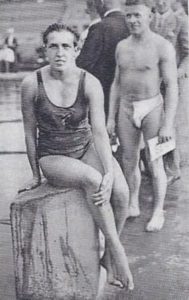
Dora Schönemann competed in two swimming events for Germany at the 1928 Summer Olympics
1911
[table]
Name,Nation,Sport,Birthday
August Banščak,Yugoslavia,Athletics,October 10 1911
Tomás Beswick,Argentina,Athletics,October 17 1911
Juan Bregaliano,Uruguay,Boxing,November 22 1911
José Castillo,Cuba,Diving,March 6 1911
João Francisco de Castro,Brazil,Rowing,December 12 1911
Rui Duarte,Brazil,Modern pentathlon,July 30 1911
Mohamed Ebeid,Egypt,Athletics,April 11 1911
Maximo Fava,Brazil,Rowing,August 12 1911
Margarethe Held,Austria,Athletics,March 19 1911
Julio Herrera,Mexico,Equestrian,March 16 1911
Flora Hofman,Yugoslavia,Athletics,November 17 1911
Hassan Ali Imam,Egypt,Wrestling,August 12 1911
Shigetaka Katsuhisa,Japan,Water polo,September 4 1911
Carlos Kennedy,Argentina,Swimming,February 16 1911
Mohammad Khan,Afghanistan,Athletics and field hockey,May 1 1911
Makoto Kikuchi,Japan,Field hockey,1911
Seibei Kimura,Japan,Water polo,October 11 1911
Hector de Lima Polanco,Venezuela,Sport shooting,March 25 1911
Vasile Moldovan,Romania,Gymnastics,August 28 1911
Horacio Monti,Argentina,Sailing,August 12 1911
Grete Nissl,Austria,Alpine skiing,November 30 1911
Ibrahim Okasha,Egypt,Athletics,1911
Ennio de Oliveira,Brazil,Fencing,November 5 1911
Mario Ortíz,Argentina,Sailing,November 21 1911
Jorge Patiño,Peru,Sport shooting,December 18 1911
Juan Paz,Peru,Swimming,September 16 1911
Olivério Popovitch,Brazil,Rowing,October 1911
Domingos Puglisi,Brazil,Athletics,November 4 1911
Ruben Ribeiro,Brazil,Equestrian,May 25 1911
Lukman Saketi,Indonesia,Sport shooting,1911
José Domingo Sánchez,Colombia,Athletics,May 20 1911
Álvaro dos Santos Filho,Brazil,Sport shooting,October 22 1911
Luis Sardella,Argentina,Boxing,July 11 1911
Irmintraut Schneider,Germany,Swimming,1911
Dora Schönemann,Germany,Swimming,1911
Fumio Takashina,Japan,Diving,1911
Humberto Terzano,Argentina,Equestrian,1911
Pedro Theberge,Brazil,Water polo,January 1911
[/table]
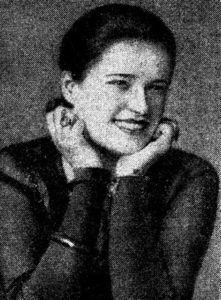
Roma Wagner represented Austria as a 100 metre swimmer at the 1936 Summer Olympics
1912
[table]
Name,Nation,Sport,Birthday
Antonio Adipe,Uruguay,Boxing,April 24 1912
Luis Albornoz,Peru,Sport shooting,November 18 1912
Baiano,Brazil,Basketball,September 27 1912
Alberto Batignani,Uruguay,Waterpolo,September 30 1912
Humberto Bernasconi,Uruguay,Basketball,November 17 1912
Carlos Choque,Argentina,Sport shooting,August 22 1912
Francisco Costanzo,Uruguay,Boxing,November 4 1912
Marcel Couttet,France,Ice hockey,April 27 1912
Iosif Covaci,Romania,Alpine and cross-country skiing,December 2 1912
Constantin David,Romania,Boxing,December 25 1912
José Feans, Uruguay,Boxing,April 24 1912
João de Faria,Brazil,Sport shooting,August 31 1912
Kenichi Furuya,Japan,Ice hockey,November 8 1912
Sergio Iesi,Uruguay,Fencing,April 8 1912
Luis Jacob,Peru,Basketball,August 13 1912
Julio Juaneda,Argnetina,Weightlifting,1912
Kozue Kinoshita,Japan,Ice hockey,April 15 1912
Osamu Kitamura,Japan,Rowing,June 29 1912
Theo Kitt,Germany,Bobsledding,October 14 1912
Ovidio Lagos,Argentina,Sailing,July 21 1912
Robert Landesmann,France,Wrestling,March 26 1912
Miguel Lopes,Brazil,Basketball,July 6 1912
Mario de Lorenzo,Brazil,Water polo,July 1912
Shoichi Masutomi,Japan,Wrestling,January 12 1912
René Morel,France,Athletics,February 21 1912
Tadashi Murakami,Japan,Athletics,October 7 1912
Marcel Noual,France,Swimming,1912
Toshio Ohtsu,Japan,Field hockey,January 23 1912
Celestino João de Palma,Brazil,Rowing,December 21 1912
Rigoberto Pérez,Mexico,Athletics,November 26 1912
Hilda von Puttkammer,Brazil,Fencing,August 13 1912
Constantin Radu,Romania,Athletics,February 13 1912
Roy Ramsay,Bahamas,Sailing,September 28 1912
Jean-Albin Régis,France,Sport shooting,February 19 1912
Kamal Riad Noseir,Egypt,Basketball,January 8 1912
Anísio da Rocha,Brazil,Modern pentathlon and equestrian,October 13 1912
José Manuel Sagasta,Argentina,Equestrian,1912
Tadashi Shimijima,Japan,Rowing,October 8 1912
Guillermo Suárez,Peru,Athletics,September 8 1912
Shoichiro Takenaka,Japan,Athletics,September 30 1912
Kojiro Tamba,Japan,Wrestling,May 10 1912
Noboru Tanaka,Japan,Field hockey,1912
Rogério Tavares,Portugual,Sport shooting,December 3 1912
Taro Teshima,Japan,Rowing,July 14 1912
Kenshi Togami,Japan,Athletics,August 1 1912
Pedro del Vecchio,Colombia,Athletics,October 16 1912
Sigfrido Vogel,Argentina,Sport shooting,September 1912
Roma Wagner,Austria,Swimming,July 21 1912
[/table]
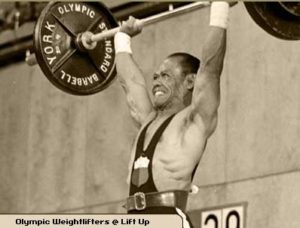
Pedro Landero, who represented Philippines in bantamweight weightlifting at the 1952 and 1956 Summer Olympics. Photograph from: http://www.chidlovski.net/liftup/l_athleteStatsResult.asp?a_id=1902
1913
[table]
Name,Nation,Sport,Birthday
Osamu Abe,Japan,Rowing,August 11 1913
Mohamed Amin,Egypt,Boxing,November 15 1913
Willy Angst,Switzerland,Wrestling,November 20 1913
Sayed Ali Atta,Afghanistan,Field hockey,August 25 1913
Frédéric Boeni,Switzerland,Diving,November 15 1913
Louis Chauvot,France,Sailing,February 14 1913
Georges Conan,France,Cycling,1913
Pierre Cousin,France,Athletics,June 14 1913
Frederic Drăghici,Romania,Gymnastics,June 1 1913
Juan Andrés Dutra,Uruguay,Rowing,October 10 1913
Mahmoud Ezzat,Egypt,Boxing,September 11 1913
Georges Firmenich,Switzerland,Sailing,December 3 1913
Ernst Fuhrimann,Switzerland,Cycling, June 28 1913
Werner George,Germany,Ice hockey,September 12 1913
Juan de Giacomi,Argentina,Sport shooting, 1913
Oscar Goulú,Argentina,Equestrian, 1913
Mario Guerci,Argentina,Rowing,January 14 1913
Tsugio Hasegawa,Japan,Figure skating, June 18 1913
Mohamed Hassanein,Egypt,Swimming,1913
Ludovic Heraud,France,Sport shooting,January 1 1913
Masao Ichihara,Japan,Athletics,November 7 1913
Albino de Jesus,Portugal,Sport shooting,August 13 1913
Koichi Kawaguchi,Japan,Equestrian,March 12 1913
Ludovico Kempter,Argentina,Sailing,November 11 1913
Werner Klingelfuss,Switzerland,Canoeing,June 11 1913
Alfred König,Austria,Athletics,October 2 1913
Hiroyoshi Kubota,Japan,Athletics,April 29 1913
Daiji Kurauchi,Japan,Field hockey,1913
Pedro Landero,Philippines,Weightlifting,October 19 1913
Melchor López,Argentina,Sport shooting,January 7 1913
Florio Martel,France,Field hockey,March 2 1913
Jaime Mendes,Portugal,Athletics,August 20 1913
Fernand Mermoud,France,Cross-country skiing,August 20 1913
Isamu Mita,Japan,Rowing,March 25 1913
Yoshio Miyake,Japan,Gymnastics,December 7 1913
Severino Moreira,Brazil,Sport shooting,September 29 1913
Zafar Ahmed Muhammad,Pakistan,Sport shooting,July 10 1913
Mie Muraoka,Japan,Athletics,March 23 1913
Takao Nakae,Japan,Basketball,April 30 1913
Chiyoto Nakano,Japan,Boxing,February 7 1913
Yoshio Nanbu,Japan,Weightlifting,March 22 1913
Karl Neumeister,Austria,Equestrian,August 15 1913
Jwani Riad Noseir,Egypt,Basketball,February 6 1913
Wanda Nowak,Austria,Athletics,January 16 1913
Benvenuto Nuñes,Brazil,Swimming,June 27 1913
Edmund Pader,Austria,Swimming,1913
Dumitru Panaitescu,Romania,Boxing,May 1 1913
Prudencio de Pena,Uruguay,Basketball,January 21 1913
Dumitru Peteu,Romania,Bobsledding,October 19 1913
Abdul Rahim,Afghanistan,Athletics,February 11 1913
Olga Rajkovič,Yugoslavia,Athletics,April 13 1913
Hertha Rosmini,Austria,Alpine skiing,November 9 1913
Shusui Sekigawa,Japan,Rowing,May 13 1913
Chikara Shirasaka,Japan,Rowing,August 18 1913
Jelica Stanojević,Yugoslavia,Athletics,July 1 1913
José de la Torre,Mexico,Sport shooting,April 3 1913
Pierre Vandame,France,Field hockey,June 17 1913
Anton Vogel,Austria,Wrestling,July 21 1913
[/table]
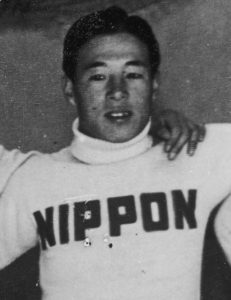
Yushoku Cho, who represented Japan in two speed skating events at the 1936 Winter Olympics.
1914
[table]
Name,Nation,Sport,Birthday
Toyoyi Aihara,Japan,Athletics,January 7 1914
Ion Baboe,Romania,Athletics,April 12 1914
Charles Campbell,Canada,Rowing,July 2 1914
José Cazorla,Venezuela,Sport shooting,February 26 1914
Yushoku Cho,Japan,Speed skating,January 18 1914
Werner Christen,Switzerland,Athletics,April 29 1914
Asa Dogura,Japan,Athletics,June 11 1914
Jean Fournier,France,Sport shooting,May 4 1914
Hugo García,Uruguay,Water polo,March 20 1914
Mitsue Ishizu,Japan,Athletics,April 16 1914
Josef Jelen,Czechoslovakia,Boxing,August 10 1914
Thea Kellner,Romania,Fencing,March 6 1914
Grete Lainer,Austria,Figure skating,June 20 1914
František Leikert,Czechoslovakia,Canoeing,May 6 1914
Masayasu Maeda,Japan,Basketball,March 10 1914
Khalil Amira El-Maghrabi,Egypt,Boxing,January 1 1914
Gheorghe Man,Romania,Fencing,March 20 1914
Georges Meyer,Switzerland,Athletics,April 17 1914
Hans Mohr,Yugoslavia,Athletics,August 6 1914
Karl Molnar,Austria,Canoeing,May 18 1914
Isaac Moraes,Brazil,Swimming,July 26 1914
František Mráček,Czechoslovakia,Wrestling,April 13 1914
Fausto Preysler,Philippines,Sailing,February 14 1914
Rosalvo Ramos,Brazil,Athletics,June 6 1914
Roger Rouge,Switzerland,Sailing,June 1 1914
Julio César Sagasta,Argentina,Equestrian,July 13 1914
Antônio Luiz dos Santos,Brazil,Swimming,July 16 1914
František Šír,Czechoslovakia,Rowing,January 22 1914
Noboru Sugimoto,Japan,Swimming,April 6 1914
Kosei Tano,Japan,Water polo,January 22 1914
Paulo Tarrto,Brazil,Swimming,April 12 1914
Anwar Tawfik,Egypt,Fencing,July 31 1914
Annie Villiger,Switzerland,Diving and swimming,April 4 1914
Takimi Wakayama,Japan,Water polo,March 30 1914
Zenjiro Watanabe,Japan,Figure skating,February 11 1914
Georg Weidner,Austria,Wrestling,January 14 1914
Otto Weiß,Germany,Figure skating,April 20 1914
Dragana Đorđević,Yugoslavia,Gymnastics,June 2 1914
[/table]
Having produced this table, we may in the future decide to create a more detailed and sortable table, including Olympic participations, on our website (which is here by the way) so that we can update it as time goes on. Next week, however, we will take a look at those 16 non-starters and demonstration event competitors in order to complete our look into the realm of research on the Oldest Olympians. We hope you will join us!
